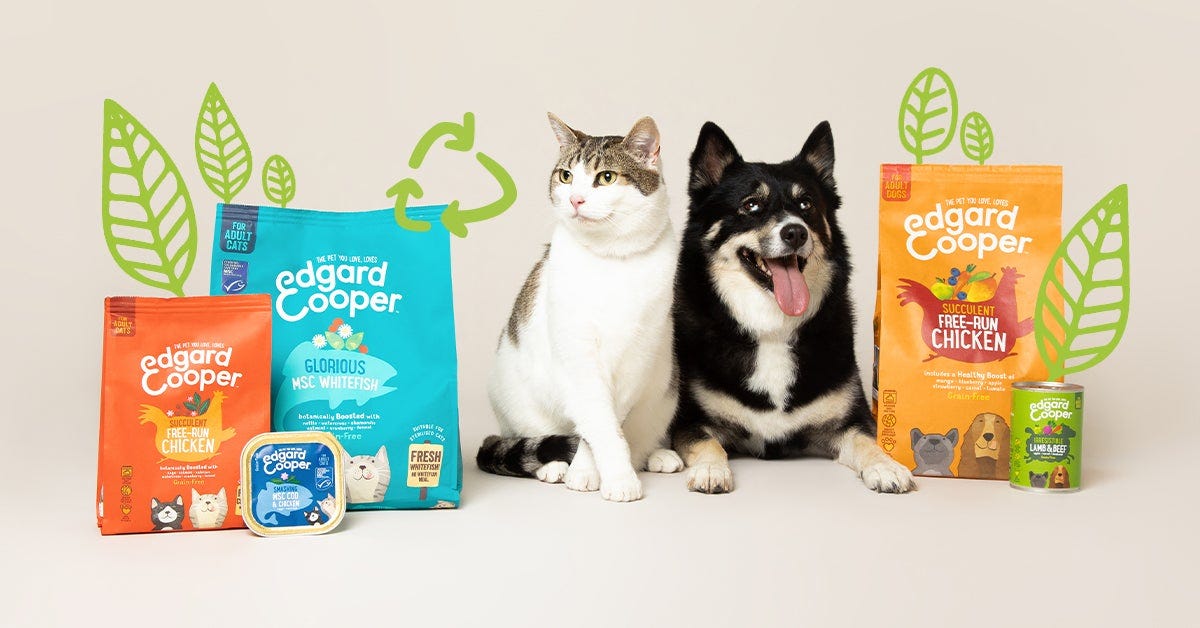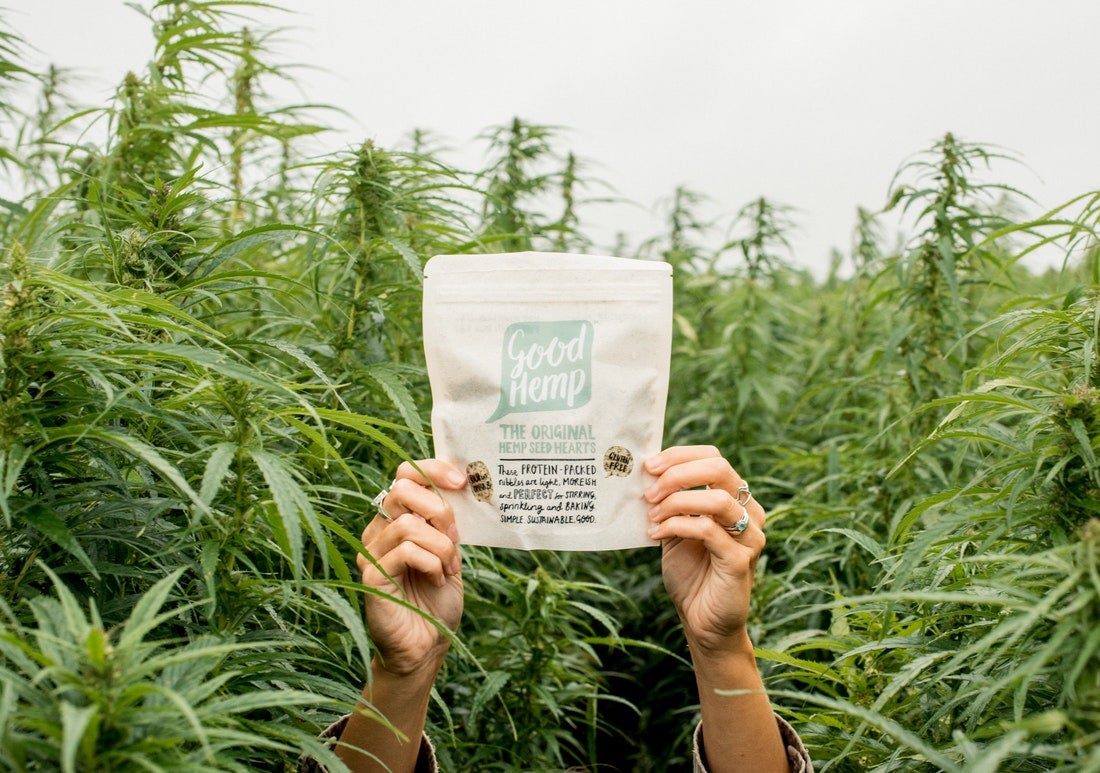🌱 Takeaways tackling circularity, and Edgard & Cooper's 'Zero Pawprint Plan'. What can brands learn?
Featuring Edgard & Cooper, Just Eat, Circla, Good Hemp and more...
Happy Monday!
This week we cover:
How Edgar & Cooper are tackling their impact, one food bowl at a time
Can takeaways be more circular? What can consumer goods businesses learn?
In case you missed it: Meet the Brands: Why Good Hemp think communication is key when you’re trying to “Unf**k the Planet”, featuring Ben Cooper, Head of Brand.
> Good News Last Week
🎯 Punchy Drinks, Rodda’s Clotted Cream, Dewerstone, &SISTERS and Summderdown have all certified as B Corp.
🎯 innocent re-certified as B Corp with a score of 105.2, up from 92.5 points in 2018.
⭐️ Makers Mark, owned by Beam Suntory, announced it’s certified as B Corp. It is the largest distillery in the world.
⭐️ PepsiCo Europe announced that it plans to eliminate virgin fossil-based plastic in all its crisp and chip bags by 2030. This will be applied to brands including Walkers, Doritos, and Lay’s. It will be delivered by using 100% recycled or renewable plastic in its packets.
⭐️ Del Monte announced it is working to develop a compostable fruit cup, as well as beverage and fruit cups that contain post-consumer recycled content.
⭐️ Aquafresh announced it’s Naturals toothpaste line, made from 97% naturally derived ingredients.
⚡️ Carbon offset rating provider Sylvera raised another £24 million in funding. Sylvera provides data on nature-based offset projects.
> Click on each link to read more.
> Brand Spotlight
Edgar & Cooper are tackling their impact, one food bowl at a time.
The Belgian-based company started when two friends sought out pet food that was as good for the planet as it was for their dogs, Edgar and Cooper. After years of research and innovation, Edgar & Cooper was born and has now grown to over 150 employees. The now cat and dog food company aims to become the most sustainable brand in the pet food aisle. How? We take a look…
Their sustainability mission is best told through their Zero Pawprint Plan, which can be broken down into three parts:
Zero-carbon emissions by 2025.
100% ethical sourcing by 2025.
Sustainable packaging by 2025.
To reach zero-carbon emissions, Edgar & Cooper utilises science-based carbon targets calculated by ClimatePartner. As part of this, ClimatePartner have calculated the pet food company’s carbon footprint and pinpointed 84% of emissions to raw ingredients in the food. The large impact of the ingredients was eye-opening for the founders, leading to a continuous journey of recipe changes in order to reduce the carbon footprint. Now, they have a scorecard for each ingredient measuring the nutritional value and carbon impact. Transparency in carbon emissions is also pivotal to the plan, as products are carbon labeled for consumer awareness.
Another area of transparency occurs in the transition to 100% ethically sourced ingredients. The meat found in pet foods is often carbon-intensive and inhumanely raised. Edgar & Cooper aims to put animal welfare at the forefront of any sourced meat. Examples of humane sourcing initiatives include: Free run chicken, grass-fed lamb, and certified fish through both MSC and ASC.
Sustainable packaging is the final focus area of the Zero Pawprint plan. By transitioning to 100% paper packaging, the company has saved over 7.5 million plastic bags from circulation. The paper packaging can be recycled or industrially composted, ensuring a more sustainable product lifecycle. They also aim to educate their consumers about how to best dispose of their packaging via their website.
Edgar & Cooper’s impact extends beyond their Zero Pawprint Plan via the numerous animal charities they donate to. From working to eradicate rabies in Kabul to ensuring medical care for animals in Chile, Edgar & Cooper’s philanthropy aims to improve the lives of cats and dogs across the globe.
Read more about Edgar & Cooper’s ambitions, take a look at their 2020 Impact Report, and learn about pet food’s impact on the planet.
Support Edgar & Cooper via their shop:
Haven’t subscribed to Following the Footprints yet?
> Quick Take
Can takeaways be more circular?
Single-use disposable products dominate the takeaway food sector. In the US, nearly 1 trillion pieces are used each year including bags, condiment packets and containers which all likely end up in landfill. The need to step away from our throwaway culture has never been greater, with this linear “take, make, waste” model fuelling climate change. Part of the solution lies in the circular economy. This focuses on increasing resource efficiency, avoiding landfill and returning waste to its natural state. In the takeaway food sector, the adoption of a convenient reuse and return system represents an opportunity to do exactly that. It’s an opportunity that many consumer goods brands can take a few lessons from.
Who’s addressing the issue?
Despite Just Eat’s partnership announcement with ClubZero last September, this is not the first time a collaborative effort has been made to tackle the issue in the UK. In 2019, cleantech company Oxwash teamed up with Deliveroo to trial a takeaway container cleaning service in Oxford and Cambridge using QR codes affixed to the packaging. However, the story ends there - there hasn’t been a whisper of the trial since its launch in 2019, perhaps serving us a clue as to how it fared. In 2019 London-based CauliBox also launched, and have been supplying businesses and customers with reusable tupper-ware ever since.
In Europe, Zero Impack are operating in Milan and Amsterdam, opting for more hygienic and durable stainless steel containers rather than plastic. Moreover, the stainless steel can be upcycled at the end of its lifetime. Additionally, the France-based company, barePack, has over 180+ participating food outlets across Paris and Lyon with a further 150+ in Singapore, after key partnerships with Deliveroo and Grabfood.
How does this work?
A customer orders a meal in-house, or from their home, and receives it in reusable container.
After the customer is done with the container, there are a few options:
They can drop-off the container to the store itself.
They can drop-off the container to an external kiosk.
They can arrange for a delivery driver collection.
When looking at how this model can be adopted via a consumer goods business, there are further options to be considered:
Customers can arrange for collection the next time their order those products.
Customers can post the product back to the vendor themselves.
Whilst the mission of many of these partners remains the same, the service that they offer can differ slightly based on the type of material used to manufacture the product, whether they offer an ‘opt-in’ feature to customers (like Zero Impack), and whether they offer a rewards-based system for consumers (like CauliBox).
What are the benefits of adopting a reuse scheme for businesses?
Increased brand loyalty - customers are more likely to turn to brands who are environmentally-conscious.
Reduced costs vs disposable products: reusable tupper-ware has a break-even point whereby the more times it is used, the more economical it is.
Reduced environmental impact via reduced waste generation, energy use, litter generation, resource extraction… the list goes on. Because of this, a consistent and tangible contribution towards any Net Zero target in place.
Increased opportunity to collaborate with other businesses - read why it’s important here.
Our key ‘takeaway’ (if you will)?
Consumer goods businesses play a key role in waste generation, but the end of life of your products is often difficult for you to tackle once it’s left a store shelf or entered a consumer’s home. Take inspiration from the schemes being trialled in the takeaway food sector, and see how other consumer goods companies, like Circla and Beauty Kitchen Ltd, are working towards a more circular packaging stream already.
Want to know more?
Read up on what US-based Deliver Zero are getting up to with their reuse scheme.
Read more on the circular economy here.
Read about how Beauty Kitchen are driving change via their ‘Re’ programme.
Read Upstream’s account of the circular economy in food service.
> In case you missed it
💥 #3 - Meet the Brands: Why Good Hemp think communication is key when you’re trying to “Unf**k the Planet”
Featuring Ben Cooper, Head of Brand
> Follow up with…
Article: 4 ways for companies to take effective climate action
Workbook/Guide: Carbon Footprint Manual






